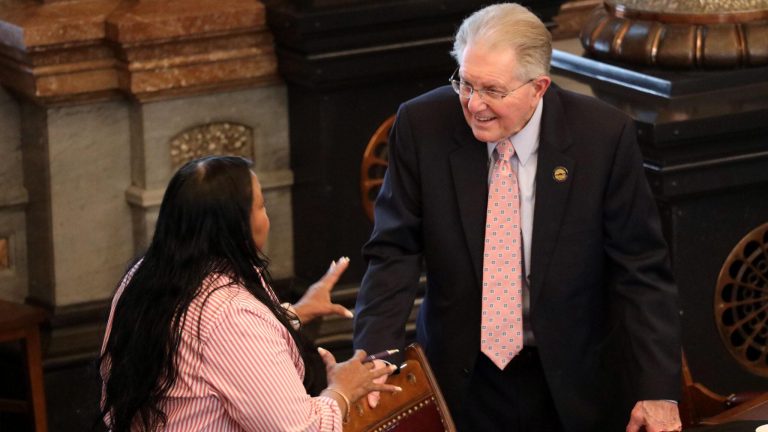
Alabama’s Tax Shift: Working Class Pays, Wealth Gains | Image Source: www.al.com
MONTGOMERY, Alabama, 31 March 2025 – A fundamental question arose in the network of debates on tax policy in Alabama: Who really benefits from the state’s latest tax changes: working citizens or the rich elite? As legislators approach the final stage of this legislative session, two competing measures are at the centre of the storm: the repeal of the overtime tax and the implementation of the controversial CHOOSE Act. Both initiatives have significant financial implications, but they cannot be different.
The repeal of overtime taxes, led by the minority House leader Anthony Daniels, was initially a bipartite success. The measure abolished the 5% overtime tax, giving the Alabamians of the working class a rare victory. According to Alabama’s Ministry of Revenue, this exemption brought over $200 million to employees in their first year. Despite the $30 million calculated in the Education Trust Fund (ETF), the real benefit is considerable for many households fighting inflation and wage stagnation. Daniels pointed out that it was not a gift – it was a compensation earned and deserved by those who worked overtime.
However, this dynamic is now threatened by the implementation of the CHOOSE Act, a broad curriculum of school vouchers aimed at redirecting public funds from education to private scholarships. Currently, the cost of $100 million with its limited start-up is expected to be between $500 million and $750 million when eligibility limits are lifted. According to data from the Alabama Revenue Department, about 70 per cent of current students were already attending private or domestic schools. This runs counter to the original message that the initiative would help students find themselves in failing public schools
What is the law of OPSIS and why is it controversial?
The Sococida Act, the flagship policy of the Republican leadership of Alabama, provides families with government-funded vouchers for sending children to private schools or home education programmes. While encouraging the choice of education, critics argue that it disproportionately helps wealthy families already disconnected from the public education system. According to estimates and registration data published by the Alabama Revenue Department, almost 70 per cent of the first beneficiaries of the programme have never been enrolled in public schools, raising concerns about equity and fiscal responsibility.
“We knew this would happen,” said an education lawyer with Alabama Arise. “It’s not about choosing; It’s about turning public money into private hands. As the Alabama Reflector report indicates, other states with similar programs have achieved similar results: low-income families often cannot take advantage of vouchers due to hidden costs such as lunch, uniforms or transportation. Instead, funding becomes a de facto discount for families who already pay pocket tweets.
What makes it more controversial is the competitive priorities of the Alabama budget. To finance the CHOOSE Act, the Republicans now plan to eliminate the tax exemption for overtime, a measure that would directly reduce the payment of housing for working-class citizens. Daniels and his democrat colleagues responded by proposing HB467, which would make the tax exemption for overtime permanent and set up a commission to study its economic effects. Daniels argues that the elimination of the exemption amounts to a reduction in wages for daily workers.
What is the impact of this budget on public education in Alabama?
The Public Trust Fund for Education, which is already under pressure, is at the heart of the issue. As Senator Arthur Orr, R-Decatur, pointed out, the loss of income from both the overtime exemption and the CHOOSE Act is expected to be approximately $350 million. Although the overtime exemption is approximately $230 million, the unrestricted expansion of the PSTS Act could significantly increase this burden. The dilemma faced by legislators is unstable: either to maintain tax relief for working families or to support the voucher program, which mainly benefits the richest households.
According to Alabama Reporter, legislators have chosen to preserve the CHOOSE Act while the overtime exemption expires. Critics say that this decision reflects the main priorities, which reward those who have the means at the expense of the working class. Advocates of public schools warn that this could lead to increased underfunding of already combated school districts, an increase in class size, and the reduction of programmes and educators that are already very meagre.
Is the elimination of the consumption tax a realistic objective?
In a separate but related debate, Alabama legislators are working to reduce the consumer sales tax from 3% to 2%, with the ultimate goal of complete elimination. This movement enjoys broad bipartite support, bringing together groups such as the conservative Alabama Policy Institute and the progressive Alabama Arise. However, the road to complete repeal is full of obstacles. As Susan Hamill, professor of law at the University of Alabama, explained, significant progress requires constitutional reforms that allow local governments to collect alternative taxes such as property taxes or income taxes, which are currently limited in the Alabama legal framework.
“Any tax reduction will only be a cosmetic band,” said Hammill, unless supported by structural changes. The challenge is compounded by the extremely low level of property taxes in Alabama, the lowest per capita in the country, and a regressive tax system that disproportionately affects low-income residents. According to the 2025 Tax Foundation report, Alabama ranks 38 in fiscal competitiveness, after all the neighbouring states of the south. This is largely due to the state’s dependence on sales tax, including the highly criticized food tax.
For cities like Foley, where 60% of the city’s budget is derived from sales taxes, reducing the purchase tax poses a significant financial risk. Mayor Ralph Hellmich warned that the elimination of a small percentage could jeopardize the funding of infrastructure projects such as roads and drainage systems. These local concerns reveal the broader challenge: while state legislators demand reductions, municipalities do not have the tools to compensate for income losses.
Can cities and counties choose not to pay local taxes?
Technically, yes, but it’s complicated. Under current legislation, local governments can only reduce food taxes if their incomes exceed a 2% growth threshold. HB387, which is part of a four-cylinder tax package approved by the House, aims to eliminate this requirement, offering cities greater flexibility. However, as the city of Hoover shows, attempts to reduce local food taxes have become legal and logistical obstacles. Hoover tried to reduce its food tax from 3.5% to 3%, but had to stop the change due to legal restrictions requiring a 25% reduction, a higher income than originally expected.
“Cities depend heavily on sales tax revenues,” said Danny Garrett, R-Trussville, who sponsored the package. Although the government has some room for manoeuvre, cities do not have access to income tax or other different income flows. This rigidity makes any change outside the tax income of food particularly risky for local governments. Even if the state advances with more reductions, the municipal purchase remains uncertain.
What do the Alabamians of the working class think about these changes?
There is increased frustration among residents who feel trapped in a political tug or war. According to statements by Democrats like Daniels and resignations of organizations from all over the political spectrum, the Alabamians of the working class are about to lose more of the expiry of the tax exemption from overtime. These are not just taxes, but respect, priorities and survival in an unstable economic climate. Daniels argues that the exemption puts more money into the economy than the costs of the state. He stressed this point by reminding legislators that “dollars are winning”
The Conservatives as Quin Hillyer columnists agree that food sales taxes are particularly harmful to low-income residents. While supporting the reduction of food taxes, it also recognises the more important structural problems to be solved. “In the long run, the state must rebalance its entire fiscal structure,” said Mr. Hillyer. But this will require overcoming significant political and constitutional obstacles and a commitment to fairness in relation to convenience.
Senator Vivian Figures, D-Mobile, echoed these sentiments and argued for an increase in property taxes to balance the budget. “We need to help people who need help,” he said. “I have no tax on food sales, period. But we have to find this tax somewhere else where those who can pay, pay.”
What about Alabama’s tax policy?
Despite all the controversy, Republican leaders seem established to preserve their tax reduction program, even if it means eliminating popular programs such as the exemption from overtime. As Lieutenant Gov. Will Ainsworth continues to advocate the complete repeal of the purchase tax, legislators try to follow a fine line: to provide relief without disrupting essential services. But without a significant reform of Alabama’s old tax code, the act of balance may not last long.
Senator Andrew Jones, R-Centre, succinctly summarized the ambition of the state: “The most important thing for me is that the state does its part and brings relief where we can and at least allows the local emergency option. However, for many, this is not enough. If new reforms are not introduced, including adjustments to the property tax system and new income options for municipalities, Alabama’s tax policy will continue to favour the few at the expense of many.
The tension between budgetary constraints and ideological objectives is more than political theatre - it’s real dollars leaving the pockets of real people. And unless something changes, people who walk the account will not be the ones who charge the benefits.




